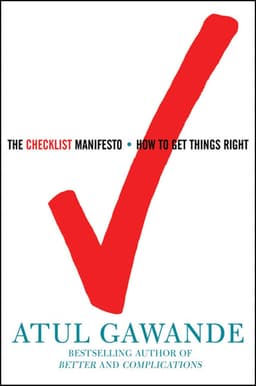
The Checklist Manifesto - 1 Minute Summary
How to Get Things Right
Book by Atul Gawande
Read the In-Depth 15 Minute Summary
The Checklist Manifesto: A Simple Tool for Navigating Complexity
In our modern world, we face an ever-increasing amount of complexity in our daily lives and work. From the intricate systems that keep our cities running to the multifaceted decisions we make in our careers, the challenges we encounter often feel overwhelming. However, in his book "The Checklist Manifesto," surgeon and writer Atul Gawande offers a surprisingly simple solution to help us navigate this complexity: the humble checklist.
Gawande argues that checklists are a powerful tool for improving performance in any field that involves complex, high-stakes tasks. By distilling the most critical steps into a concise, easy-to-follow format, checklists ensure that teams consistently execute on the essentials, even under pressure. Gawande draws on examples from aviation, construction, and his own experience in surgery to show how checklists have dramatically reduced errors and improved outcomes in these fields.
But the power of checklists goes beyond just catching mistakes. Gawande explains that well-designed checklists can also foster better communication, teamwork, and decision-making. By creating a shared mental model and a culture of discipline, checklists empower teams to work together more effectively and adapt to changing circumstances. They provide a framework for continuous improvement, allowing teams to identify and address weak spots in their processes.
So how can we apply these lessons in our own lives? Gawande suggests that we start by identifying the most complex, failure-prone aspects of our work or personal lives. These could be anything from planning a major project at work to managing a chronic health condition. Next, we should break these tasks down into their essential components and create a checklist that covers the key steps. The checklist should be concise, clear, and easy to use in real-world settings. Finally, we must commit to using the checklist consistently and updating it as we learn and improve.
By embracing the discipline of checklists, we can all become better equipped to handle the complexities of modern life. Whether we're professionals seeking to provide better service, leaders striving to guide our teams, or simply individuals trying to stay on top of our responsibilities, checklists offer a simple but powerful tool for ensuring that we get the fundamentals right. In a world of increasing complexity, that's a manifesto worth embracing.

